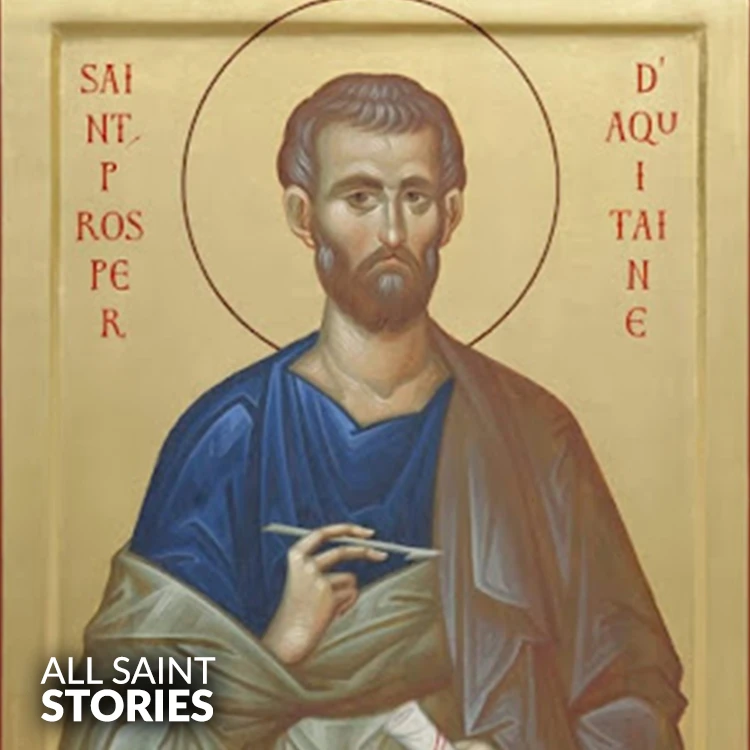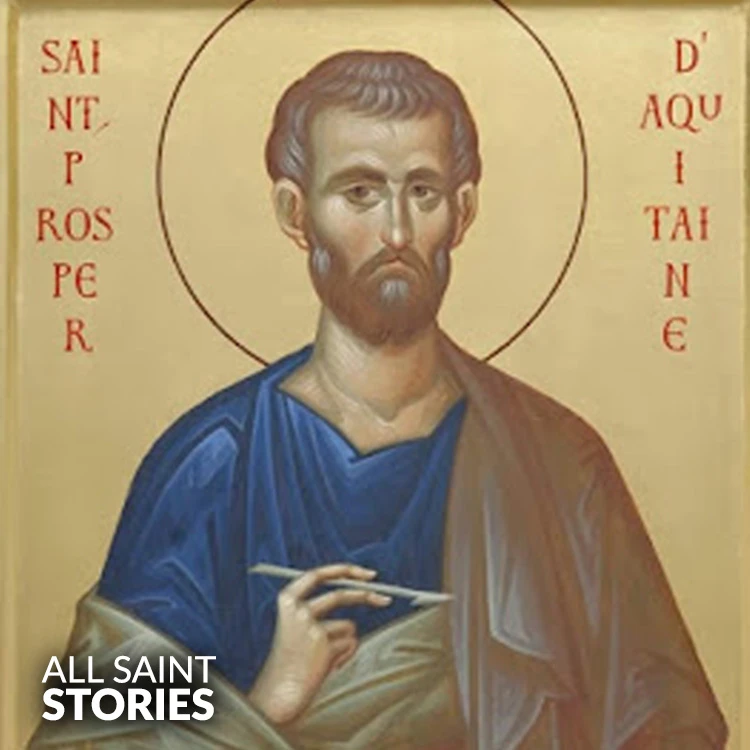Saint Prosper of Aquitaine, faithful servant of God, you devoted your life to spreading His Word and defending the truths of the faith. Intercede for us, that we may grow in wisdom and grace, and remain steadfast in our belief in Christ. Help us to follow your example of humility and devotion, and may your prayers guide us closer to the heart of God. Through Christ our Lord. Amen.
ST. PROSPER OF AQUITAINE
ST. PROSPER OF AQUITAINE

St. Prosper of Aquitaine was a theologian and defender of St. Augustine’s doctrine of grace. He played a pivotal role in the early Church’s battle against Pelagianism, advocating that salvation requires divine grace. His writings greatly influenced the development of Christian teachings on grace, free will, and predestination.
St. Prosper of Aquitaine was born around 390 in the region of Aquitaine, in southern Gaul, during a time when the theological debates of the early Church were intense. He received an education that steeped him in Christian thought, especially in the teachings of St. Augustine. Throughout his life, Prosper became known for his strong defense of Augustine's doctrine of grace, a theological position that emphasized the necessity of divine grace for salvation.
The Pelagian controversy was one of the most significant theological disputes of the 5th century. Pelagius, a British monk, argued that humans could achieve salvation through their own efforts, without the necessity of God's grace. He believed that the human will was sufficient to choose good and avoid evil, thus denying the need for divine aid in salvation. This position was deemed heretical by Augustine, who argued that human beings were so deeply affected by original sin that they could not turn toward God without the help of divine grace.
Prosper emerged as one of the most passionate defenders of Augustine’s views during this controversy. He rejected the Pelagian position and firmly supported the necessity of grace for salvation. His writings were influential in spreading Augustine's teachings across the Western Church. One of his most notable works was De Vocatione Gentium (On the Calling of the Gentiles), which emphasized that God’s grace was responsible for calling Gentiles to faith, thereby expanding the reach of salvation beyond the Jews.
In addition to his writings, Prosper engaged in theological debates with other scholars of his time, helping to shape the Church's response to the Pelagian heresy. He also supported the concept of predestination, a doctrine that teaches that God, in His sovereign will, chooses who will be saved. According to Prosper, this was an act of divine grace, given freely by God, rather than as a result of human effort or merit.
Although Prosper’s writings were not always widely accepted at the time, they had a lasting impact on the development of Christian doctrine. His defense of grace and predestination helped to solidify these teachings within the Western Christian tradition. Prosper’s theological contributions were influential in the shaping of the Church's stance on salvation, and his writings continued to be referenced by later scholars, particularly during the debates of the Reformation.
St. Prosper is not universally regarded as a saint within the Church, and there is no official record of his canonization. Nonetheless, his legacy remains significant in the history of Christian theology, particularly in the Western Church. His dedication to preserving and propagating the teachings of St. Augustine made him an important figure in the theological landscape of his time. His writings remain a valuable resource for scholars and theologians seeking to understand the early Church's understanding of grace, free will, and predestination.
Video Not Found
The information on this website is compiled from various trusted sources. While we aim for accuracy, some details may be incomplete or contain discrepancies.
If you notice any errors or have additional information about this saint, please use the form on the left to share your suggestions. Your input helps us improve and maintain reliable content for everyone.
All submissions are reviewed carefully, and your personal details will remain confidential. Thank you for contributing to the accuracy and value of this resource.
Credits & Acknowledgments
- Anudina Visudhar (Malayalam) – Life of Saints for Everyday
by Msgr. Thomas Moothedan, M.A., D.D. - Saint Companions for Each Day
by A. J. M. Mausolfe & J. K. Mausolfe - US Catholic (Faith in Real Life) – Informational articles
- Wikipedia – General reference content and images
- Anastpaul.com – Saint images and reflections
- Pravachaka Sabdam (Malayalam) – Saint-related content and insights
We sincerely thank these authors and platforms for their valuable contributions. If we have unintentionally missed any attribution, please notify us, and we will make the correction promptly.
If you have any suggestion about ST. PROSPER OF AQUITAINE
Your suggestion will help improve the information about this saint. Your details will not be disclosed anywhere.
© 2026 Copyright @ www.allsaintstories.com



 English
English
 Italian
Italian
 French
French
 Spanish
Spanish
 Malayalam
Malayalam
 Russian
Russian
 Korean
Korean
 Sinhala
Sinhala
 Japanese
Japanese
 Arabic
Arabic
 Portuguese
Portuguese
 Bantu
Bantu
 Greek
Greek
 German
German
 Dutch
Dutch
 Filipino
Filipino